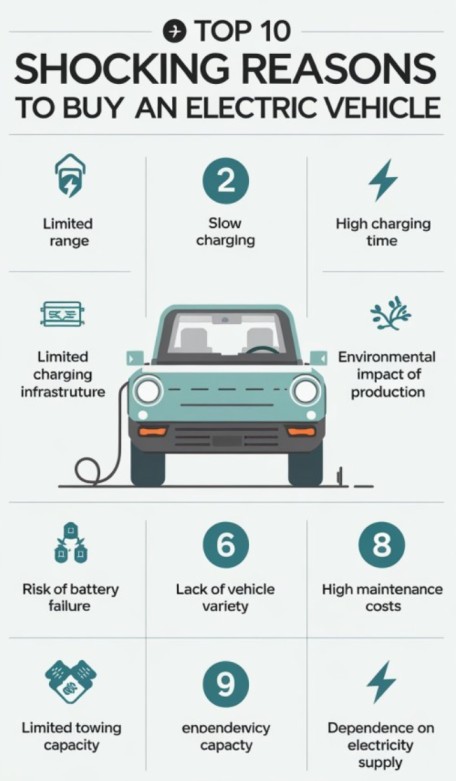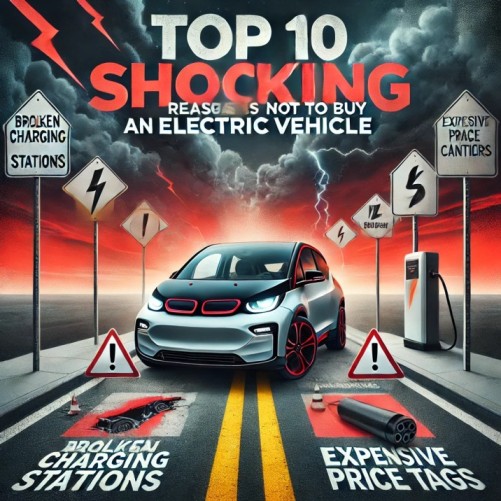Are you a big fan of EVs (Electric Vehicles)? If yes, then the details in this article might shock you as we are going to list the Top 7 Shocking Reasons Not To Buy An Electric Vehicle.
In today’s world, EVs and AI are the hottest topics. These two are involved in every aspect of life. From the start of the day until the end of the day, you are surrounded by AI and EV technology. In this article, we will focus on EVs, which are the future of transportation.
As we all know, people buy EVs due to multiple well-known factors like efficiency, cost saving, Environmental friendly, less noise pollution, less maintenance, better handling, and the list goes on.
But we got a little deep into the topic, researched it, and want to tell you that many myths need to be debunked as soon as possible before you buy your first or next EV to avoid pitfalls, as these often go unnoticed.
EVs are not as environmentally friendly as these are shown or advertised. This is because the electricity to power EVs is generated from non-renewable resources, and batteries are made with processes that involve Carbon emissions, which is more than petrol, diesel or CNG.
Top 7 Shocking Reasons Not To Buy An Electric Vehicle
Battery Challenges
When we talk about EVs, the first thing that comes to mind will be the batteries. Batteries are the main source of energy for EVs. Moreover, batteries are one of the most expensive components in an Electric vehicle.
Though we know that there have been many improvements in the batter segment as new startup companies are coming up with innovative ideas, there are several issues that persist.
- High Cost: Yes, when you go to buy a car battery, you will burn your pockets. Since batteries are the major component of the EV, it costs almost 40% of the total EV cost. That’s insane. We never thought of that while buying an EV.
Talking about India, a 1 kWh battery costs around ₹13,000 INR. This mainly increases the vehicle’s upfront cost.
- Limited Lifespan: Since batteries have a lifespan like in our smartphones or power banks, Most EV batteries also have a lifespan. These degrade over time. For an EV based on the usage of the EV, a battery cycle lasts between 500 to 1000 charge cycles. This means we might need to replace the battery within 5 years. Technology may improve in the coming years. But this is the scenario currently in 2024.
- Heavy Weight: Many of you must have lifted a normal battery and must have felt the weight. EV batteries are relatively heavy. For example, a 4 kWh battery weighs around 20 kg. This means that your 2000 Kg EV will become 2020kg. Although 20kg looks negligible in front of 2000 kg, it does count. This eventually affects the performance of the EV, the way of handling, and of course, the energy efficiency is depleted.
- Environmental Impact: Now, the best thing about an EV is the worst thing about the EV. What does that mean? EVs are not as eco-friendly as they look. This is true, but not completely. Batteries are produced in factories, and the production of EV batteries is not eco-friendly. For example, for just mining lithium or cobalt or nickel from which the batteries will be made, a lot of resources (renewable and non-renewable like coal or fossil fuels) are required, and a lot of carbon particles are released as a by-product degrading the environment. Don’t you think it is contrary to the EVs objective of a Greener and cleaner environment?
Charging Time and Infrastructure
Another point we can discuss is the charging time that an EV takes. It is considerably longer than refuelling petrol, diesel or CNG cars.
- Slow Charging: The EV charging technology is getting better day by day, but still, it is slow. Even fast chargers are relatively slow and take around an hour or so (depending on the charger and the EV company), and with a standard charger, you might need to put it on charge and go to sleep. A good sleep time is 6+ hours.
- Limited Charging Stations: Now, many of you will be living in rural or semi-urban areas where the charging station facility is none or near to none. Charging infrastructure is also not that good in urban areas. Since we have fewer charging stations than the number of EV cars and more people are inclined towards EVs, charging stations are overcrowded most of the time (Especially during peak hours).
Hidden Maintenance Costs
Another myth that we want to debunk is that EVs have less to no maintenance cost since EVs don’t require frequent oil changes and have fewer moving parts.
Please don’t think this before buying an EV. Have a heavy pocket before buying an EV. Let us face reality.
- Specialized Mechanics:
In India, the skilled labour in EV repairs is very low. Local mechanics can repair petrol or CNG cars, but they still need to learn EV technology.
Since an Electric Vehicle has many advanced EV components such as batteries, electronic chips, and electric motors, it requires specialised mechanics for repairs.
Now, the skilled mechanics will ask for more money, and you need to get ready to shell out your hard-earned money again. This spikes up the EV maintenance cost.
- Increased tyre Wear: As we already know, EVs are heavier due to their batteries, and they also provide instant torque. Due to this, tyres suffer more strain, causing faster wear and tear of the tyre. Then, a tyre replacement will be required, and again, you need to put your hands in the pocket.
High Insurance Costs
Whenever you buy any vehicle or an EV, you need to buy insurance. But for EVs, the insurance premium is higher than for petrol vehicles. This is due to mainly two reasons, as stated below.
- Repair Costs: EVs have high-tech components which are costly. For example, a battery, an electronic chip or an electric motor. These parts cost a lot while repairing or for insurance as well.
- Specialized Services: Since EVs require specialised mechanics and tools, the cost is higher, as stated in the above point. This makes it riskier and allows insurance companies to ask for higher premiums if you want to insure your EV.
Performance in Extreme Weather
Though EVs are advertised to be a high-end vehicles and are known for performance. But this is true only when your EV is running in optimal weather conditions.
Do you stay in an area where the weather is pleasant? What about people who live in extreme weather, like too hot or too cold? For example, the desert areas are too hot and near sea or ice or where the sunlight reaches less, these areas are too cold.
- Cold Weather: Battery efficiency drops significantly and makes EVs unreliable for long trips. This is true for any machine but affects EVs the most as they are dependent on the batteries.
- Hot Weather: Excessive heat can also cause batteries to overheat, which would degrade the batteries and eventually will lead to degraded performance and potential thermal runaway and could catch fire, as we have seen multiple fire accidents with the EVs. Since EVs have high-voltage batteries, which poses additional risks, there should be technology like cooling systems, which the EV manufacturer is well aware of and is working on. This looks scary, doesn’t it?
Towing Capacity
Are you a person who wants to buy an EV to tow heavy loads? Then EVs are not for you. We know that EVs provide the best instant acceleration. However, they lack the power or torque to tolerate heavy loads like other vehicles. This is a major disadvantage as there could be situations where your friend’s car got stuck in the mud, and you want to take it out. Your EV will disappoint you in that situation.
Depreciation and Resale Value
All the vehicles, including EVS, petrol, diesel, or CNG vehicles, are depreciating assets. But the value of EVs depreciates faster. The main two reasons are:
- Battery Degradation: EVs are powered by batteries, and batteries do age and die. Battery capacity is reduced like our smartphone batteries, which makes smartphones also a depreciating asset. This eventually decreases the running range of the EV. Now, why would a buyer go for a vehicle which would require costly replacements?
- Technological Advances: EV technology is evolving day by day, and new models are coming at a very high rate. It is the same situation that we see in the smartphone world. For example, every year, a new iPhone is launched.
New EVs will have better technology, improving the range, charging, and features, and the old ones will be lost, hence the resale value.
So, we would say that EVs will not dominate the automotive market anytime soon, as you have been told by many experts. The reasons are simple and clear. EVs lack in multiple segments like battery technology, charging infrastructure, high maintenance costs, performance in non-optimal situations and last but not least, less resale value.
Then what is the future?
The future lies in technologies like hydrogen fuel cells and flywheel energy storage, which offer better solutions as they are truly environmentally friendly.
A must-read for EV lovers: Why Rely on EV Charging When the Future Lies in Hydrogen Cartridges?


